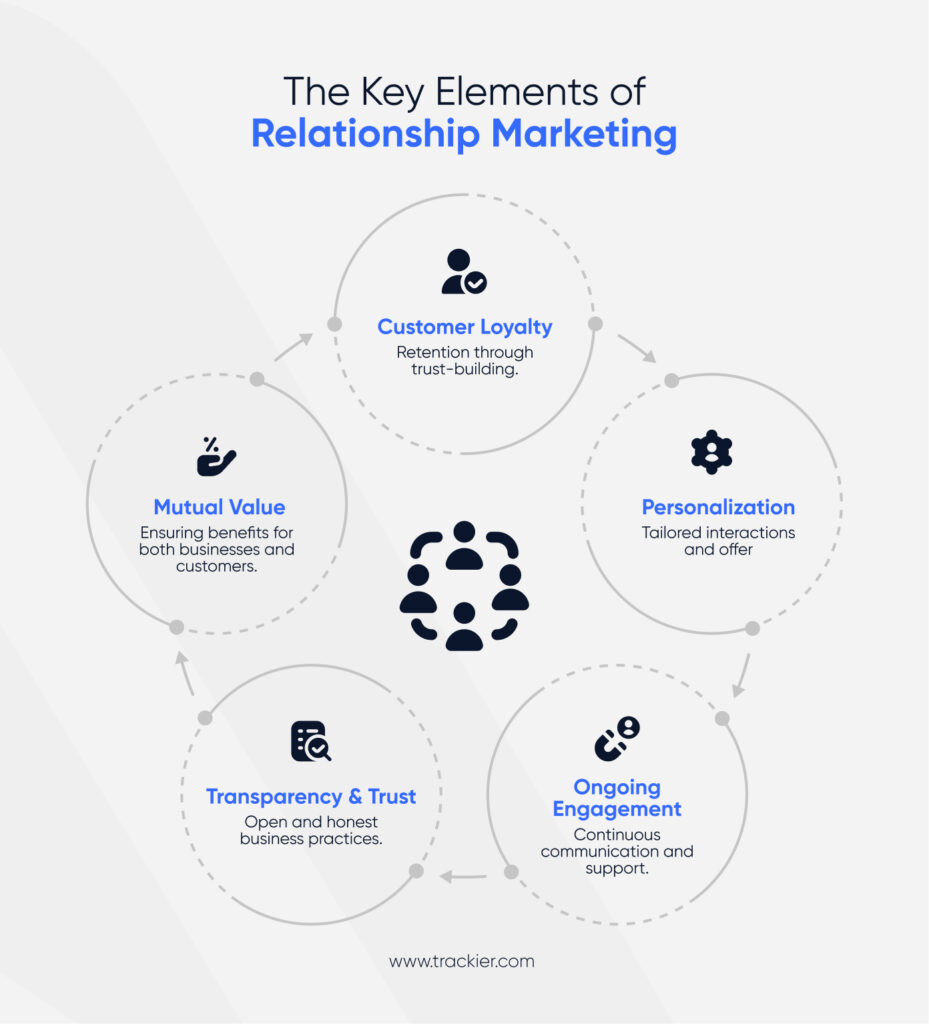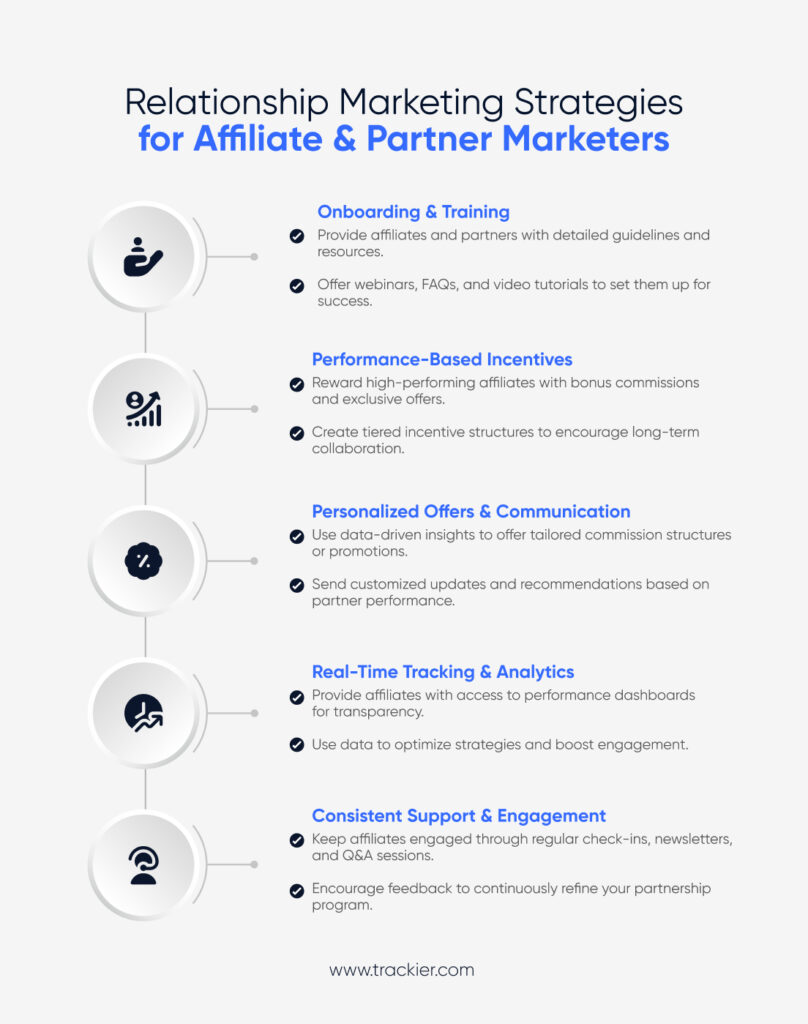In the digital era, companies require more than transactional marketing tactics to win the hearts of customers and partners over the long term. Marketing relationship strategy focuses on customer retention and relationship building, instead of focusing on repeated sums of money as is the case with transactional marketing.
Nowhere is this more true than within partner marketing, affiliate marketing and performance marketing where strong relationships can result in ongoing revenue growth and business growth.
As consumers and partners increasingly expect more personalized and value-centric engagement brands who treat relationship marketing seriously get a leg up on the competition. A good strategy not only boosts retention, but also earns trust and authority, which are more valuable long-term assets.
What is Relationship Marketing?
Unlike traditional marketing that is based on a single transaction, relationship marketing is a strategy that is more aimed at establishing engagement, trust, and loyalty over time. Brands that focus on buyer satisfaction build strong connections and grow repeat business, referrals and lifetime value.
For partner and affiliate marketing, that means fostering relationships, being transparent, and giving partners the support, technology and tools they need to make it a win-win for both parties. Brands that adopt this approach enjoy longer-lasting partnerships, more effective campaign performance, and great returns.

Why Relationship Marketing is Key in Performance Marketing
1. Building Long-Term Relationships
With performance marketing, it’s all about maintaining strong, sustainable relationships with affiliates, influencers, and publishers in order to be successful. Trust is developed through open and transparent communication, fair pay and goals that foster collaboration, ultimately leading to success.
2. Enhancing Customer Retention
It’s more costly to attract new customers then it is to retain old ones. Through relationship marketing techniques, companies can create deeper loyalty and convert customers into advocates that generate referrals and repeat business.
3. Gaining Competitive Advantage
As the digital marketing landscape becomes cluttered, businesses that concentrate on “relationship management” hold advantage over the rest. Engage customers and partners with customized experiences, rewards management, and endless other engagement ideas.
Key Relationship Management Strategies
1. Making Customer Experience a Priority
An exceptional client experience is the foundation for building a lasting marketing relationship. Research has indicated that people are more inclined to remain loyal to a business if it provides timely assistance, proactive answers, and customized communication.
A relationship strategy grounded in fast responsiveness, problem solving and continued engagement can dramatically improve retention.
2. Personalization and Segmentation
Personalization is the basis of relational marketing. Customers expect that brands know their preferences and offer them personalized suggestions. With data analytics, businesses can segment and dice their audiences by behavior, purchase history and preference to run super-personalized campaigns.
For affiliate and partner marketers, personalization might look like providing exclusive offers, unique commission structures or custom content to different partners depending on their audience and performance.
3. Loyalty Programs for Sustained Engagement
Loyalty programs have proven to be an effective relationship management strategy in various industries. Businesses that reward customers for repeat purchases and engagement see higher retention rates. Effective strategies can include:
- Point-based rewards programs (accumulating points for purchases).
- Access to exclusive sales or events for loyal customers.
- Referral programs inviting existing customers to bring in friends and family.
Affiliate and performance marketers can make use of relational marketing approaches, by introducing performance-related incentives and bonuses – also milestones can be rewarded too.
4. Utilizing Email Marketing for Ongoing Communication
Email marketing can be a personal and cost-effective way to stay in touch.
Email and personalized product recommendations, follow ups and promotions focused on the customer and partner maintain a high level of engagement.
For affiliates, use email marketing to send out performance updates, new campaign offers and new educational content that can help lead to better working partnerships.
5. Active Engagement on Social Media
Social media is an incredible marketing relationship tool. By regularly interacting with your customers in comments, DMs or with educational or fun content, you earn their trust and establish your brand’s credibility.
Performance and affiliate marketers can utilize social platforms to talk to their audience, share updates, and interact with followers as they come.
6. Incorporating Customer Feedback
Feedback from customers and partners is key to refining and enhancing marketing strategies. Businesses show they respect customers, when they listen well and make changes as they are needed.
Feedback from partners in the affiliate space can also help brands fine-tune commission structures, make on-page and ad-content more effective, and better the program overall.
7. Referrer/Affiliate/Influencer Programs
One of the most effective ways to build long-term customer relationships is through referral and affiliate programs. When customers and partners are incentivized to refer others, they become active brand advocates.
Using relational marketing to grow your business is about reaching more, engaging more and selling more.

Relationship Marketing Examples
Real-world relationship marketing examples show how brands successfully build lasting connections with customers and partners.
Below are three notable examples:
1. Starbucks Rewards Program
Starbucks has what is arguably one of the most successful customer loyalty programs. With their mobile app that offers personal promotions, incentives for repeat purchases and easy payment options, they keep the customer engaged and incentivized to return.
2. Amazon Prime
Amazon Prime gives an excellent example of how subscription-based loyalty schemes can encourage lifetime engagement. Want a simple answer? Amazon’s own recipe for member satisfaction is simple: exclusive benefits, free shipping, video streaming, special discounts, etc.
3. Apple Ecosystem
Apple’s holistic ecosystem delivers a seamless experience to users and drives loyalties through interconnected devices, seamless support, and proprietary services such as iCloud and Apple Music. This is all about maintaining customer retention and brand advocacy.
These marketing relationship examples illustrate how adopting customer-centric strategies can instill long-term engagement and loyalty.
How Trackier Supports Marketing Relationship
Trackier provides a comprehensive solution to help businesses monitor and optimize their marketing relationship efforts. With real-time tracking, detailed analytics, and customizable automation tools, Trackier enables brands to:
- Measure the performance of partners and affiliates with accurate and precise tracking.
- Maximise engagement strategies by identifying the best performing campaigns.
- Improve communication with associates with auto updates and tips.
- You can optimize ROI on marketing relationships by better targeting and rewarding.
By using Trackier, businesses can ensure their relationship strategy aligns with long-term success, increasing both partner and customer retention.
Conclusion
A well-executed marketing relationship approach is essential for businesses looking to build loyalty and long-term engagement. By focusing on customer experience, personalization, loyalty programs, and proactive communication, brands can create sustainable relationships that drive consistent growth.
For affiliate, partner, and performance marketers, maintaining strong relationships is key to success.
With the right tools, like Trackier, businesses can streamline and enhance their efforts, ensuring measurable results and continued growth.
Hungry for more?
Sign up for our weekly newsletter to get tips like these delivered, straight to your feed.
1. What is the difference between a marketing relationship and customer service?
A marketing relationship focuses on building long-term trust, loyalty, and mutual value between a brand and its customers or partners, often using consistent engagement strategies. Customer service, on the other hand, is reactive support provided when issues arise. A strong marketing relationship often reduces the need for frequent problem resolution because the brand proactively addresses needs and expectations.
2. How can small businesses build a strong marketing relationship without a big budget?
Small businesses can leverage cost-effective methods like personalized emails, active social media engagement, and referral incentives. By focusing on authenticity, quick responses, and genuine appreciation for customers and partners, they can create a marketing relationship that rivals larger brands without heavy spending.
3. Can marketing relationships improve affiliate and partner program performance?
Yes. When affiliates and partners feel valued, supported, and fairly compensated, they are more motivated to promote the brand consistently. A well-managed marketing relationship can lead to higher-quality referrals, better conversion rates, and longer-term collaboration in affiliate and partner programs.
What metrics should be tracked to measure the success of a marketing relationship?
Key metrics include customer lifetime value (CLV), partner retention rates, repeat purchase frequency, engagement rates on communication channels, and referral program participation. These indicators reveal the health of a marketing relationship beyond one-off sales numbers.
How does technology like Trackier enhance a marketing relationship?
Technology platforms such as Trackier streamline communication, automate performance tracking, and provide real-time insights. This helps brands identify high-value partners, tailor incentives, and quickly adjust strategies, ultimately strengthening the marketing relationship and driving better results.



